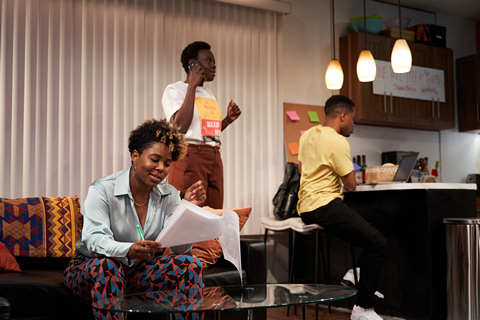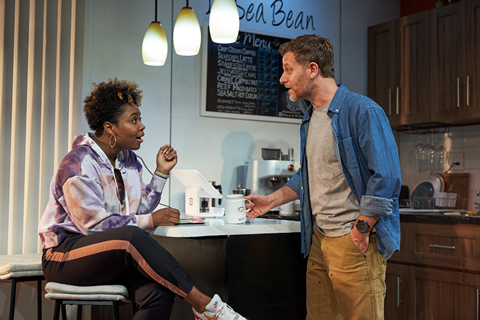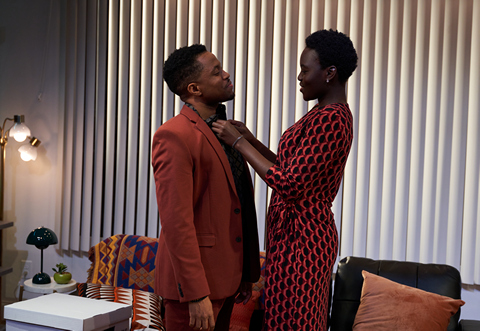La Race
"LaRace," world premiere by Bleu Beckford-Burrell, is about the push and pull of political and social definitions that shape and define lives within a diverse neighborhood.

Naomi Lorrain, Shaunette Renée Wilson and Christopher B. Portley in a scene from Bleu Beckford-Burrell’s “La Race” at the McGinn-Cazale Theater (Photo credit: Daniel J Vasquez)
[avatar user=”Scotty Bennett” size=”96″ align=”left”] Scotty Bennett, Critic[/avatar]
“You know what the problem is? People tryna make Gods outta people but we ain’t gods, shit God ain’t God, if we made in his image, right? Then he sure ain’t perfect…probably flawed as fuck.” Dejani Brown
This is a perceived truth from the mouth of a Black woman, a survivor of life’s travails, living in Far Rockaway, Queens, New York City. It is a line from La Race, and it is a statement that Bleu Beckford-Burrell uses to show what her play is about; the push-pull of political and social definitions that shape and define the lives of Black women within a diverse neighborhood. It is a story that presents the wide-ranging and diverse experiences, politics, cultures, and personal views of Black women in a “forgotten” area of the city through comedy, gentleness, and fiery rage.
Taylor Reynolds has directed an excellent ensemble in bringing this play to life in an engaging, thought-provoking, and heartfelt way, but not without some issues. Through his direction and the actors’ performances, La Race challenges the audience with clearly articulated and impactful ideas. However, the success in presenting those ideas depends on how they are performed, which is one of the problematic areas. Expressing strong emotions about an issue is challenging without being preachy or strident. There are scenes where certain key characters go into rants about racism, sexism, and gentrification that seem out of place with the carefully constructed plot lines that approach those issues in a less strident and more thoughtful way.

Naomi Lorrain and Vince Nappo in a scene from Bleu Beckford-Burrell’s “La Race” at the McGinn-Cazale Theater (Photo credit: Daniel J Vasquez)
The play opens with Maxine, played by Naomi Lorrain, in a strong performance, speaking with a therapist. The conversation defines the conflict Maxine struggles with regarding her sense of self and her current unemployment situation. What transpires over the course of the play is how Maxine copes with being manipulated by her roommate AJ into becoming a reluctant candidate for the city council. AJ, well-acted by Shaunette Renée Wilson, is a radical in her approach to social and political issues. For her, there is no gray; everything is black and white. Her opinions lack subtlety and grace; it is all bluster and fume. This is especially true with the issues of gentrification and diversity confronting her Far Rockaway community.
Maxine decides to go along with the campaign idea as more of a distraction from her own personal issues than a real commitment to becoming a city council member. AJ, in the role of campaign manager, puts together a motley crew of workers, giving each a distinctive role to play in the election.
Trey (well-done by Christopher B. Portley), a neighbor and friend of Maxine and AJ, is a reliable helper to both women, and he has a strong romantic attraction to AJ, although that fact is not apparent to AJ. He is the go-to person for material things needed for the campaign. Uriel (Auberth Bercy with an excellent performance) is a Haitian immigrant who is made the financial manager. We first meet Uriel as a barrister in a trendy, newly opened coffee shop called Le Sea Bean and later in other jobs. She has strong religious ties but was recently asked to leave her church. She is relentlessly optimistic and a hard worker. Rounding out this group is Dejani (excellently acted by Stacey Sargeant, who also plays Maxine’s therapist), who is described in the play’s notes as “Loud, proud, and astutely profound.” She is a Black woman from the city-owned apartment buildings. She knows and is known by many of the groups that populate the “projects,” including members of some local gangs. She is made the Director of Volunteers with the job of getting the people in the housing projects on board with the campaign.

Christopher B. Portley and Shaunette Renée Wilson in a scene from Bleu Beckford-Burrell’s “La Race” at the McGinn-Cazale Theater (Photo credit: Daniel J Vasquez)
And into this mix is Grant (smoothly handled by Vince Nappo), a white man dealing in real estate and one of the people involved in the gentrification of the local neighborhood, a fact known only to Uriel during the campaign. In addition, he develops a romantic relationship with Maxine, which adds additional stress to her life because she has to keep it secret from AJ and the rest of her campaign team.
The cast does a good job of dealing with some of the complicated aspects of a story about diversity and gender, but there are some bumps in their presentations. There are moments when some dialog is overwrought, and some of the interpersonal interactions are unclear and don’t quite ring true, but these are not significant issues to the overall thrust of the play.
The scenic design by Arnulfo Maldonado, although very well done, seems out of place for the Far Rockaway setting of the play. It is a well-appointed, very nice-looking apartment that is supposed to be in an area of the city that is not top-tier. However, it does work well with the scene changes needed to move the story’s location. The changes from an apartment to a coffee shop to a therapist’s office are easily accomplished. The costume design by Sarafina Bush is true to the period is impressive. Stacey Derosier and Bailey Costa’s lighting design works perfectly with the play’s structure. Germán Martinez’s sound design is well-executed.
La Race. (through December 23, 2022)
Page 73 and Working Theater
McGinn-Cazale Theater, WP Theater, 4th Floor, 2162 Broadway, in Manhattan
For tickets, visit http://www.ci.ovationtix.com/3082/production/1138986?performanceId=11162029
Running time: two hours and 30 minutes including one intermission






Leave a comment